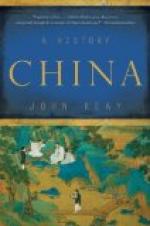In the strongest contrast to these thinkers was the school of Mo Ti (at some time between 479 and 381 B.C.). The Confucian school held fast to the old feudal order of society, and was only ready to agree to a few superficial changes. The school of Mo Ti proposed to alter the fundamental principles of society. Family ethics must no longer be retained; the principles of family love must be extended to the whole upper class, which Mo Ti called the “people”. One must love another member of the upper class just as much as one’s own father. Then the friction between individuals and between states would cease. Instead of families, large groups of people friendly to one another must be created. Further one should live frugally and not expend endless money on effete rites, as the Confucianists demanded. The expenditure on weddings and funerals under the Confucianist ritual consumed so much money that many families fell into debt and, if they were unable to pay off the debt, sank from the upper into the lower class. In order to maintain the upper class, therefore, there must be more frugality. Mo Ti’s teaching won great influence. He and his successors surrounded themselves with a private army of supporters which was rigidly organized and which could be brought into action at any time as its leader wished. Thus the Mohists came forward everywhere with an approach entirely different from that of the isolated Confucians. When the Mohists offered their assistance to a ruler, they brought with them a group of technical and military experts who had been trained on the same principles. In consequence of its great influence this teaching was naturally hotly opposed by the Confucianists.
We see clearly in Mo Ti’s and his followers’ ideas the influence of the changed times. His principle of “universal love” reflects the breakdown of the clans and the general weakening of family bonds which had taken place. His ideal of social organization resembles organizations of merchants and craftsmen which we know only of later periods. His stress upon frugality, too, reflects a line of thought which is typical of businessmen. The rationality which can also be seen in his metaphysical ideas and which has induced modern Chinese scholars to call him an early materialist is fitting to an age in which a developing money economy and expanding trade required a cool, logical approach to the affairs of this world.




